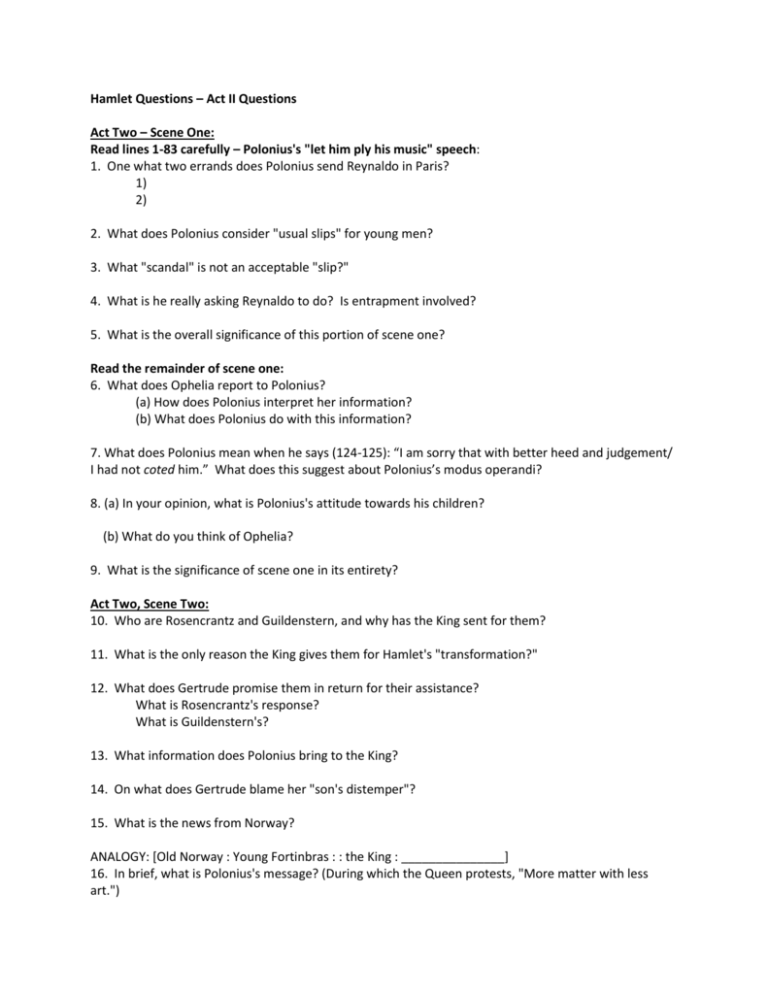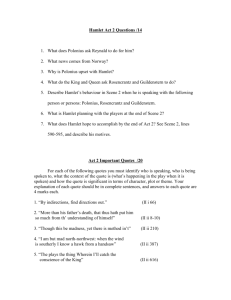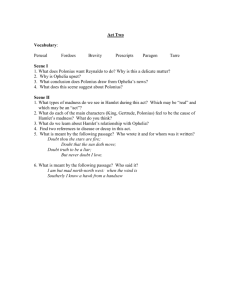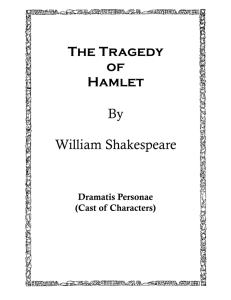Hamlet Act II (all) ques 2015
advertisement

Hamlet Questions – Act II Questions Act Two – Scene One: Read lines 1-83 carefully – Polonius's "let him ply his music" speech: 1. One what two errands does Polonius send Reynaldo in Paris? 1) 2) 2. What does Polonius consider "usual slips" for young men? 3. What "scandal" is not an acceptable "slip?" 4. What is he really asking Reynaldo to do? Is entrapment involved? 5. What is the overall significance of this portion of scene one? Read the remainder of scene one: 6. What does Ophelia report to Polonius? (a) How does Polonius interpret her information? (b) What does Polonius do with this information? 7. What does Polonius mean when he says (124-125): “I am sorry that with better heed and judgement/ I had not coted him.” What does this suggest about Polonius’s modus operandi? 8. (a) In your opinion, what is Polonius's attitude towards his children? (b) What do you think of Ophelia? 9. What is the significance of scene one in its entirety? Act Two, Scene Two: 10. Who are Rosencrantz and Guildenstern, and why has the King sent for them? 11. What is the only reason the King gives them for Hamlet's "transformation?" 12. What does Gertrude promise them in return for their assistance? What is Rosencrantz's response? What is Guildenstern's? 13. What information does Polonius bring to the King? 14. On what does Gertrude blame her "son's distemper"? 15. What is the news from Norway? ANALOGY: [Old Norway : Young Fortinbras : : the King : _______________] 16. In brief, what is Polonius's message? (During which the Queen protests, "More matter with less art.") (a) Hamlet is ______________. (b) His transformation is because: (c) What proof does Polonius offer? 17. What plan does Polonius suggest to convince the King and Gertrude that he is correct in his diagnosis of Hamlet's problem? 18. What is the connotation of "loose" in line 176? 19. When Polonius asks Hamlet: "Do you know me, my lord?" what does Hamlet respond? 20. “For if the sun breed maggots in a dead dog, being a good kissing carrion – “ Hamlet interrupts himself here and asks Polonius, “Have you a daughter?” Then he says, “Let her not walk i’ the sun.” Consider the word “sun” and its connection to “son.” What is Hamlet warning Polonius about? What might he be saying in referring to breeding maggots”? 21. What is your reaction to Polonius's comment: And truly in my youth I suff'red much extremity for love – very near this. 22. When Polonius observes of Hamlet, “Though this be madness, yet there is method in’t,” (line 223) what does he mean by “method”? 23. (a) Summarize Polonius's assessment of Hamlet. (b) Summarize Hamlet's assessment of Polonius. 24. Is Hamlet initially glad to see Rosencrantz and Guildenstern? 25. What does Hamlet describe as "a prison"? 26. What does Hamlet mean in lines 268-270? 27. When Rosencrantz suggests that Denmark "is too narrow for [Hamlet's] mind, what is Hamlet's response? 28. When Hamlet asks them why they have come to Elsinore? 29. When Hamlet suggests they were sent for and asks them to “deal justly” with him, Guildenstern asks, “What should we say?” What is Hamlet’s reaction to this odd question? Then Hamlet says, “…there is a kind of confession in your looks which your modesties have not craft enough to color.” Interpret or paraphrase the underlined part of the line. 30. Fill in Hamlet's summary of his change of attitude towards the earth, the air, and man: "This goodly frame, the earth" IS REALLY: "this most excellent canopy" and "this majestical roof fretted with golden fire" IS REALLY : "man. . . noble in reason, infinite in faculties, in form and moving, . . . express and admirable in action, . . . .like an angel in apprehension, . . . like a god! the beauty of the world; the paragon of animals " IS REALLY: 31. What is the implication of "He that plays the king shall be welcome [2.2.343]"? 32. Hamlet’s last remark to Guidenstern (lines 402-403) is “I am but mad north-north-west. When the wind is southerly, I know a hawk from a handsaw,” sounds like the incoherent ravings of a madman. What warning is he giving Rosencrantz and Guildenstern here? 33. Does Hamlet treat Polonius with proper respect? Why or why not? 34. (Use YOUR BIBLE to read Judges 11.) IMPORTANT. (a) How is Polonius analogous to Jephthah? (b) Write down the details about Jephthah's daughter: Hamlet Questions – Act II – Beginning with entrance of players 35. According to Hamlet, who are the "abstract and brief chronicles of the time [2.2.524]? 36. When Polonius says, "My lord, I will use [the players] according to their desert [2.2.527], what is Hamlet's response? 37. About whom is Hamlet speaking when he says, "Follow that lord, and look you mock him not [2.2.571-572]"? 38. In Hamlet's second soliloquy –[2.2.576-634], he questions his own delay. (a) What is the dramatic significance of his questions? (Why does Shakespeare have Hamlet question himself?) (b) What does he determine to do?







